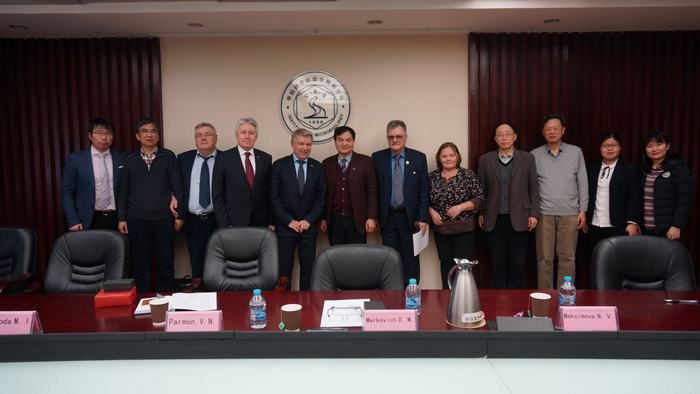Academician Parmon V.N., Chairman of Siberian Branch of Russian Academy of Sciences (SB RAS) led a five persons’ delegation visited the Institute of Microbiology, Chinese Academy of Science (IMCAS) on the afternoon of January 24, 2019.
LI Junxiong, IMCAS Deputy Director, said Siberian Branch of the Russian Academy of Sciences plays an important role in the basic scientific research of Russian, especially in the development of the scientific and technological innovation in Siberian region.
Parmon said that Siberia is a pillar of stability and development of Russia in the past, present and future. He also added that this visit to CAS and CAS institutes is the first formal visiting of the SB RAS to foreign countries in 2019. He hoped that SB RAS and CAS can establish the cooperative relationship under the “one belt and one road” cooperation plan advocated by China. He also looked back upon the close relationship between he himself and CAS that he was awarded by Chinese Government with Certificate of Friendship in appreciation of the enthusiastic support for China construction and friendly cooperation in 2018.
YANG Huaiyi, Director of Department of Research Projects, introduced the history development, research areas, international cooperation and international talent plan of IMCAS.
HUANG Li, Principal Investigator, State Key Laboratory of Microbial Resources, introduced Hydrosphere Microbes: A Chinese Initiative to Understand the Roles of Microorganisms in Elemental Cycling. Parmon was very interested in this area and he said Siberian is rich in natural resources that they could explore the cooperation in the microbial resources in lakes and thermal springs.
MA Juncai, Director of Center for Microbial Resource and Big Data, briefed the center. The center also takes the responsibilities of the World Date Center for Microorganisms. He hoped to carry out the cooperation in culture preservation and microbial resources data.
YAO Yijian, Director of Herbarium Mycologicum, Academiae Sinicae, also hoped to carry out the cooperation in the collecting and analyzing fungi with SB, RAS. Dr. TONG Zhou at CAS Key Laboratory of Pathogenic Microbiology and Immunology outlined of the research areas and development of the lab, especially the remarkable achievements in the emerging and reemerging infectious diseases and the international cooperation with the Russian as well.
LI hoped China and Russia to carry out the multi-aspect and multi-level cooperation in the microbiology and Parmon agreed to the future cooperation upon this visit.
After the meeting, the delegation visited China General Microbiological Culture Collection and Herbarium Mycologicum.

group photo
